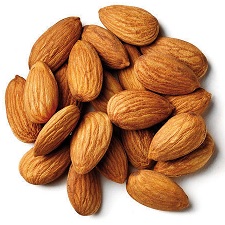Dec 29, 2025
Dec 29, 2025
 Since times immemorial almonds have attained religious, ethnic, and social importance. In the Holy Bible the Book of Numbers tells us of Aaron's rod which blossomed and bore almonds representing the divine approval of Aaron by God (Num. 17: 1-11). Many explorers consume almonds while travelling along the "Silk Route' between Asia and the Mediterranian. Nuts and seeds are a positive addition to diet.
Since times immemorial almonds have attained religious, ethnic, and social importance. In the Holy Bible the Book of Numbers tells us of Aaron's rod which blossomed and bore almonds representing the divine approval of Aaron by God (Num. 17: 1-11). Many explorers consume almonds while travelling along the "Silk Route' between Asia and the Mediterranian. Nuts and seeds are a positive addition to diet.
Nuts contain monounsaturated and polyunsaturated fats which improve heart health by reducing LDL (low density lipoprotein) cholesterol. LDL is responsible for blocking blood vessels including those of the heart.
Nuts and seeds taken as "snacks" curb hunger and control appetite. Almonds and walnuts contain fatty acids which convert in the body to omega-3-oils which reduce blood clots of the cardiac and cerebral vessels reducing the risk of stroke. Many seeds are rich in their antioxidant vitamin E content. Vitamin E is highly regarded for its anti-ageing properties. Sunflower seeds are also a rich source of vitamin E.
Composition of Almonds
The almond is the kernel of a small fruit that grows on trees. It is closely related to plums, peaches and cherries. In addition to a full range of members of vitamin B, almonds contain a significant measure of
Vitamin E, and minerals like Magnesium, Copper, Zinc, Potassium and Selenium. About 90 per cent of the fat in almonds is mono- or polyunsaturated fat which is good for the heart. Almonds lower "bad" cholesterol (LDL,VLDL), and increase "good" cholesterol (HDL). About 30 grams of almonds give 170 Calories, and the total fat is 14 grams. It also contains protein, carbohydrates, dietary fibre ans minerals.
Health benefits of almonds:
Thus, almonds with all the uses they can be employed with benefit are useful healthy nuts.
23-Mar-2020
More by : Dr. Frank S. K. Barar